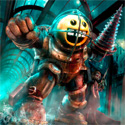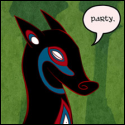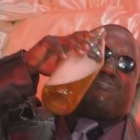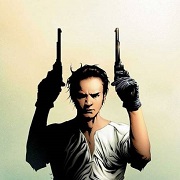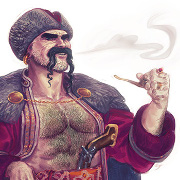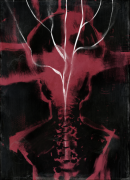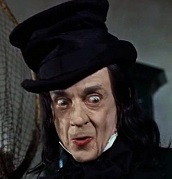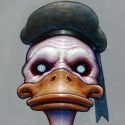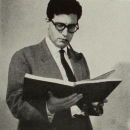Groke posted:Any book where the narrator first goes on a long digression (one of many) about something completely irrelevant (but interesting), and then takes the extra time to directly apologize to the readers for wasting their time, has something going for it. He's almost Pierre Menarding Dumas, just because a light parody of Dumas' style can be more accessible to a modern reader than Dumas' original prose.
|
|
|
|
|

|
| # ? May 25, 2024 15:23 |
|
Jack2142 posted:I feel like GRRM wants to write short stories, because the last couple ASOIAF books honestly feel like they could be cut into entirely separate novella's and be alot more cohesive than the books. He got big as a screenwriter and had a fuckin' ball with all of his short stories including the Wild Cards Experiment, I think you're on to something here. I think Tuf Voyaging might be my favorite Martin stuff after the first three ASOIAF.
|
|
|
GreyjoyBastard posted:I think Tuf Voyaging might be my favorite Martin stuff after the first three ASOIAF.
|
|
|
|
|
Groke posted:Any book where the narrator first goes on a long digression (one of many) about something completely irrelevant (but interesting), and then takes the extra time to directly apologize to the readers for wasting their time, has something going for it. Paarfi of Roundwood posted:And while it would be possible for us to simply relate all that followed the casting of this simplest of spells, we must admit that we would find it more amusing to delay this revelation; or rather, to find an indirect method of describing it. While the amusement of the historian may be insufficient reason to take such a circuitous route to relation of facts, rest assured we have another reason as well, that being the necessity of describing another conversation in which these very events are announced. I just reread Jhereg and Yendi and I'm now a few chapters into Taltos (I skipped Teckla because I don't think I can take going through that a third time at the moment). I'd forgotten a bunch of stuff, including how early you find out about Vlad's previous life, how short the early books are, and how rough around the edges they are in some respects.
|
|
|
|
anilEhilated posted:Before, definitely before. He's got a lot of good short stories outside that, too, it just takes some digging - basically if you combed the three GRRM collections and put the good stories, it would be a loving amazing book. I own a hardcopy of the Fevre Dream novella. It good. I think.
|
|
|
|
Yay! New Craig Schaefer book just downloaded to the kindle! It's out like an hour early, and I am incredibly happy because the last book didn't pop up on the kindle until about 4am on "release day", and I was awake and staring at amazon going CMON MAN. It's even on KU if you don't wanna drop 3.99 on it.
|
|
|
|
New Craig "Writing Machine" Schaefer novel out. Harmony Black book 4, "Cold Spectrum".
|
|
|
|
Kesper North posted:New Craig "Writing Machine" Schaefer novel out. Harmony Black book 4, "Cold Spectrum". This madman must be stopped before it is too late.
|
|
|
|
Stupid_Sexy_Flander posted:Yay! New Craig Schaefer book just downloaded to the kindle! I’m not totally there for the HB series, but for $4? Sure.
|
|
|
|
Neil Gaiman is a loving hack nowadays. Just finished Norse Mythology and that book only shows that you can get anything published nowadays if you are famous. That book is just a simple reiteration of the most common tales from the Norse mythology and there is basically nothing unique that one haven't already read in like 5 other versions of the mythology. I mean, when you get beaten by Amon Amarth, a death metal band, in creativity, you have really done zero effort. American Gods was at least interesting in terms of using various mythologies, but this was just a boring piece of poo poo.
|
|
|
|
I mean, it's kinda in the title?
|
|
|
|
This retelling of old myths is such a ripoff, it's just retelling old myths!
|
|
|
|
Cardiac posted:Neil Gaiman is a loving hack nowadays. It was like reading a wikipedia article about the norse gods. I don't know if having such a lifeless writing style was deliberate - felt like Gaiman was trying for and failing at a 'storyteller by the fire' thing? - or if he really was just phoning it in. American Gods did some interesting stuff with Odin, at least. Showed that Gaiman was thinking about sacrifice and belief but yeah, this was just a nothing of a book. It's not like you even need to actively subvert the myths to get good mileage out of them. A.S. Byatt's Ragnarok had something like three chapters following Jormungandr as it grew on the bottom of the sea without pushing an 'actually the monster is good' switcheroo.
|
|
|
|
I've been thinking about science fiction lately as a genre with a distinct and traceable history - I think because it's ironically very much a product of its times. And because I consider myself pretty well-read, and well-read in sci-fi as well, but there are still authors like Doris Lessing or Octavia Butler who I know are considered really, really important but whom I've never read. Or Philip K. Dick or Ursula le Guin , who I've barely read. If you had to outline... let's call it 20 novels, from the 1930s to the modern day, which would give someone a good impression of the development and history of science fiction as a genre, what would you throw in there?
|
|
|
|
That's a really difficult question, particularly at that number of books. Like, you mention Le Guin...she's written quite a body of work, and has influenced a lot of people. She should probably be on a list like that, but should you list her for Rocannon's World which introduced the word 'ansible' or The Left Hand of Darkness which arguably pushed the entire genre towards a greater cultural consciousness? Or The Ones Who Walked Away from Omelas for being one of the most-cited and reprinted stories ever? I guess I usually end up hating lists of 'best SF books ever!' because they tend to be very unambitious or even worse, crowdsourced. They're often just a list of books that were popular, and not necessarily genuinely well-crafted or interesting (even with caveats like 'for the time') and not always books that were influential but later forgotten. (Adam Roberts is probably the person doing the best 'history of SF as a genre' work right now though a lot of his stuff is genuinely academic and thus not always easily accessible)
|
|
|
|
Maybe consider the Nebula award winners? Since the Hugo is a popular-vote award, it includes both classics and forgettable dreck (e.g. They'd Rather Be Right or The Wanderer). As a juried award selected by SF writers themselves, the Nebulas are a bit more reliable as indicators of quality. (Although they have their own flaws -- I like Alexei Panshin fine, but no way does Rite of Passage win over Do Androids Dream of Electric Sheep or Stand on Zanzibar.)
|
|
|
Stupid_Sexy_Flander posted:Yay! New Craig Schaefer book just downloaded to the kindle! How are the Harmony Black books? I'm a decent Schaefer fan, really enjoyed the Faust books (though I haven't read the most recent one) and I liked the Revanche Cycle (though I'm not sure I could recount the plot of the books if you held a gun to my head, so there's that). I've never touched the HB books because I don't find the character that interesting, but I could be convinced otherwise. In other news I'm reading KSR's Aurora and it's... something. I'm not sure what to make of it. I've never read any KSR before so I'm not familiar with his personal style. Aurora feels like reading a history book, which I guess is part of the conceit. It's very dry, took forever for anything to happen, and even now that things are happening it just doesn't feel very dramatic or urgent. I guess it's possible this is just a style of sci-fi I've never really encountered before, but I'm maybe halfway through and just don't feel any urge to finish it.
|
|
|
|
MockingQuantum posted:How are the Harmony Black books? I'm a decent Schaefer fan, really enjoyed the Faust books (though I haven't read the most recent one) and I liked the Revanche Cycle (though I'm not sure I could recount the plot of the books if you held a gun to my head, so there's that). They're not as good as the Faust books, largely because Harmony just isn't as interesting as a character. That said, if you want to get the whole picture for what's going on in the setting, I'd say they're almost required reading. A lot of what happened in Castle Doctrine tied in with events from Glass Predator. I expect that the plots of the two series will become increasingly intertwined as the overall story moves towards its climax.
|
|
|
|
|
Selachian posted:Maybe consider the Nebula award winners? Since the Hugo is a popular-vote award, it includes both classics and forgettable dreck (e.g. They'd Rather Be Right or The Wanderer). As a juried award selected by SF writers themselves, the Nebulas are a bit more reliable as indicators of quality. (Although they have their own flaws -- I like Alexei Panshin fine, but no way does Rite of Passage win over Do Androids Dream of Electric Sheep or Stand on Zanzibar.) Skimming the Hugo finalists for interesting books could also be useful
|
|
|
|
freebooter posted:If you had to outline... let's call it 20 novels, from the 1930s to the modern day, which would give someone a good impression of the development and history of science fiction as a genre, what would you throw in there? You could do worse than to work through this syllabus from Georgia Tech's Science Fiction course, although it leans more towards short stories for time reasons. https://pwp.gatech.edu/lyaszek/wp-content/uploads/sites/61/2015/02/LMC-3214-Syllabus.pdf
|
|
|
|
occamsnailfile posted:I guess I usually end up hating lists of 'best SF books ever!' because they tend to be very unambitious or even worse, crowdsourced. They're often just a list of books that were popular, and not necessarily genuinely well-crafted or interesting (even with caveats like 'for the time') and not always books that were influential but later forgotten. This. I just read a list that included Snow Crash, the loving cyberpunk DaVinci Code, among the standard "canon" (Dune, Foundation, Neuromancer, Left Hand of Darkness...) because it supposedly thought up the "mind blowing" idea of people using avatars online (which was done first in Gibson's Burning Chrome). I recently read Stanislaw Lem's Microworlds, which is a collection of his essays on science fiction, and it's hilarious how much he hated pretty much all of it. His extremely specific criteria meant the books had to be genuinely mind-blowing (to him—and he was a bloody genius), or else it was trash. If you'd asked him what works of SF he thought worthy of posterity it would only include works by H. G. Wells, Olaf Stapledon, Phillip K. Dick, Arkady and Boris Strugatsky, and Ursula K. Leguin. And obviously his own, because Solaris may be the best SF novel of all time. Stuporstar fucked around with this message at 18:08 on Oct 31, 2017 |
|
|
|
To be fair Snow Crash is kinda remarkable for being one of the clearest examples of its subgenre while parodying it at the same time. Cyberpunk was schizophrenic like that, I think PKD would have approved.
|
|
|
|
|
anilEhilated posted:To be fair Snow Crash is kinda remarkable for being one of the clearest examples of its subgenre while parodying it at the same time. Cyberpunk was schizophrenic like that, I think PKD would have approved. Snow Crash would have been better if he'd set of that Chekov's nuclear bomb at the end of the novel rather than ending it on a wet fart. The problem was it wasn't satirical enough, weakly skirting the line, and blowing up the MAD biker's bomb would have solidified it as an amazingly ridiculous novel rather than just a merely ridiculous one. Stuporstar fucked around with this message at 18:13 on Oct 31, 2017 |
|
|
|
I remember Snow Crash ending with a deus ex skateboard. That alone elevates it. Deus ex skateboard Stephenson ending is somehow more believable than deus ex cougar Stephenson ending.
|
|
|
|
Cardiac posted:Neil Gaiman is a loving hack nowadays. Whoa, easy on the Amon Amarth. Twilight of the Thunder God is one of the greatest workout songs ever written
|
|
|
|
freebooter posted:I've been thinking about science fiction lately as a genre with a distinct and traceable history - I think because it's ironically very much a product of its times. And because I consider myself pretty well-read, and well-read in sci-fi as well, but there are still authors like Doris Lessing or Octavia Butler who I know are considered really, really important but whom I've never read. Or Philip K. Dick or Ursula le Guin , who I've barely read. The only one that immediately comes to me as a definite must-pick is William Gibson's Neuromancer.
|
|
|
|
Khizan posted:The only one that immediately comes to me as a definite must-pick is William Gibson's Neuromancer. Early stages: H.G. Wells The Time Machine or Mary Shelley Frankenstein Early dystopia: Aldous Huxley Brave New World or Yevgeny Zamyatin We Golden age: Isaac Asimov Foundation or I, Robot and Robert A. Heinlein Have Spacesuit, Will Travel (to get the feel of the juveniles and avoid both the fascism of Starship Troopers and the insanity of Stranger in a Strange Land) New Wave: Harlan Ellison I Have No Mouth, and I Must Scream Roger Zelazny My Name Is Legion (yes, it's a fixup, deal) Cyberpunk: William Gibson Neuromancer Walter Jon Williams Hardwired
|
|
|
|
^ I'd like to add to that list: Humanist SF: Frank Herbert Dune Ursula K. Leguin The Left Hand of Darkness Octavia Butler Xenogenesis Trilogy or Parable of the Sower And something by Phillip K. Dick should be added to the New Wave, probably Ubik. NoNostalgia4Grover posted:I remember Snow Crash ending with a deus ex skateboard. That alone elevates it. Deus ex skateboard Stephenson ending is somehow more believable than deus ex cougar Stephenson ending. Nah it ended with the nuclear robodog blowing up the plane with the L. Ron. Hubbard-alike baddy on it, even though the robodog had come to save the "nice girl" and she'd already escaped a while ago. It's sufficiently stupid, but I still feel cheated that the nuke didn't go off because it was right there. Why the hell wouldn't you? Stuporstar fucked around with this message at 20:39 on Oct 31, 2017 |
|
|
|
I feel like it's missing another generation of SF that's pretty well established at this point, one that goes for the big ideas and grandiosity of the Golden Age while leaving behind the sometimes dated idealism. Blindsight springs to mind as a good example. Also I'm not sure it fits in any of the categories described but for me The Stars My Destination is pretty representative of a certain style and era. You could argue it fits in "New Wave" though, I guess.
|
|
|
|
|
MockingQuantum posted:I feel like it's missing another generation of SF that's pretty well established at this point, one that goes for the big ideas and grandiosity of the Golden Age while leaving behind the sometimes dated idealism. Blindsight springs to mind as a good example. Yeah, Bester could definitely ride along with the New Wave. I feel like Blindsight fits in a category along with Solaris, in terms of fiction dealing with the incomprehensibility of the truly alien. But that kind of fiction is scattered so far across the timeline, there isn't an easy place to put it in. Some of Arthur C Clarke's work fits along that line as well. I don't know what to call this category, but it all involves trying to comprehend minds beyond our comprehension: Arthur C. Clarke Rendevous with Rama or Childhood's End Stanislaw Lem Solaris Arkady and Boris Strugatsky Roadside Picnic Peter Watts Blindsight Stuporstar fucked around with this message at 20:53 on Oct 31, 2017 |
|
|
|
E.M. Forster The Machine Stopsulmont posted:avoid both the fascism of Starship Troopers
|
|
|
Stuporstar posted:Yeah, Bester could definitely ride along with the New Wave. Yeah, in terms of content, there's definitely a thread running through all of those. But even stylistically, I feel like Watts represents a next-step in the genre that sort of embraces a scientifically-backed pessimism. Like as we've learned more about space and the possibility (or lack thereof) of alien encounters, the difficulty of interstellar travel, more and more writers kind of take in that body of knowledge and treat it as a startling revelation of how little we really know. Blindsight is at once terrifying and wondrous, and feels very "modern" in a way that a lot of actually modern sci-fi lacks because writers are attached to tropes that defined the genre for decades. All that said, I honestly can't come up with another book that fits that description, so maybe Blindsight is an outlier or just really had an effect on me. I don't remember it that well because I read it right after it came out, but I think Robert Charles Wilson's Spin does have some similar tonal notes.
|
|
|
|
|
Blindsight is awesome, and I also hope that sci-fi starts in that direction. KSR's aurora has a similar, 'we're hosed' theme to it. I didn't like it as much though.
|
|
|
|
MockingQuantum posted:Yeah, in terms of content, there's definitely a thread running through all of those. But even stylistically, I feel like Watts represents a next-step in the genre that sort of embraces a scientifically-backed pessimism. Like as we've learned more about space and the possibility (or lack thereof) of alien encounters, the difficulty of interstellar travel, more and more writers kind of take in that body of knowledge and treat it as a startling revelation of how little we really know. Blindsight is at once terrifying and wondrous, and feels very "modern" in a way that a lot of actually modern sci-fi lacks because writers are attached to tropes that defined the genre for decades. It's funny because this is pretty much the criteria for what Lem wanted science fiction to be, but saw so little of it in both the American and Russian SF traditions at the time. Solaris is kind of Blindsight's progenitor, not just in content but tone. The only major difference is Peter Watts has more current science to back his ideas, whereas Solaris is mostly surreal allegory. Stanislaw Lem's Imaginary Magnitude has a bunch of incredibly precient thoughts about AI and the technological singulary in it that also kinda fit the bill, but the book can be hard going because it's written as the introductions to fictional books from the future so it's incredibly dry. I love his "Introduction to Bitic Literature" though, especially since current AI experiments have pretty much produced a lot of what he foretold in that one. Golem XIV (also in Imaginary Magnitude) may also meet your criteria of extreme scientific pessimism. Edit: I suppose the key difference in how you and I are placing it, is I see Blindsight as the result of slow evolution, an undercurrent in SF that remained mostly submerged, like a recessive gene, until he burst on the scene. Stuporstar fucked around with this message at 21:29 on Oct 31, 2017 |
|
|
|
I actually just finished Blindsight, after picking up Firefall during the weekend (= Blindsight + Echopraxia collected in one book). The truly alien nature of the alien in it was definitely a well executed sci-fi idea, and overall there was this disturbing undercurrent running over the whole novel that somehow got to me. Another aspect of the book I enjoyed was the nature of the protagonists, all more or less something else than base human in their own way, in how their "adjustments" had changed the way they thinked and viewed the world and situation.
|
|
|
Doorknob Slobber posted:Blindsight is awesome, and I also hope that sci-fi starts in that direction. KSR's aurora has a similar, 'we're hosed' theme to it. I didn't like it as much though. I'm reading Aurora right now and I definitely know what you mean. Aurora feels so impersonal and distant that it's hard to feel much of anything about the characters and their plight. I was way more invested in the weird modified humans of Blindsight than anybody in Aurora.
|
|
|
|
|
freebooter posted:If you had to outline... let's call it 20 novels, from the 1930s to the modern day, which would give someone a good impression of the development and history of science fiction as a genre, what would you throw in there? Making an attempt to provide a full list, which others will likely strongly disagree with, and which is likely woefully lacking due to my own ignorance: Frankenstein - Mary Shelley (1818) The Time Machine - H. G. Wells (1895) A Princess of Mars - Edgar Rice Burroughs (1912) The Trial - Franz Kafka (1925) Brave New World - Aldous Huxley (1931) I, Robot - Isaac Asimov (1950) Fahrenheit 451 - Ray Bradbury (1953) Starship Troopers - Robert A. Heinlein (1959) Dune - Frank Herbert (1965) Do Androids Dream of Electric Sheep? - Philip K. Dick (1968) The Forever War - Joe Haldeman (1974) The Left Hand of Darkness - Ursula K. Le Guin (1974) The Hitchhiker's Guide to the Galaxy - Douglas Adams (1979) Neuromancer - William Gibson (1984) The Handmaid's Tale - Margaret Atwood (1985) The Player of Games - Iain M. Banks (1988) Snow Crash - Neal Stephenson (1992) Old Man's War - John Scalzi (2005) Blindsight - Peter Watts (2006) [Late addition] Ancillary Justice - Ann Leckie (2014) I tried to go for novels which represent their era (or defined it), rather than necessarily the best books of the era, though many of these are quite excellent. It's a bit heavy on the 60s-80s, because that era had a ton of development in science fiction. Edit: gently caress, after I posted this I saw a comment that mentioned Blindsight by Peter Watts. That absolutely deserves to be in this list - probably swap out The Fifth Season for that instead. Man, choosing only 20 is really loving hard. Arcsech fucked around with this message at 21:54 on Oct 31, 2017 |
|
|
|
Stuporstar posted:It's sufficiently stupid, but I still feel cheated that the nuke didn't go off because it was right there. Why the hell wouldn't you? I'd have been impressed if he subverted the Chekov's gun it represented and did something like realizing they could just shoot the warhead first.
|
|
|
|
I think the exercise is a good one, and could be fun as long as people keep firmly in mind the goal of being representative rather than popular or even showing what has stood the test of time (there's lots of stuff that kind of sucks now, but meant a hell of a lot back then, for example). I think you'd be better off mixing short stories freely with novels, since the short story was so instrumental in building the genre. I can't imagine leaving out "Who Goes There?", for instance.
|
|
|
|

|
| # ? May 25, 2024 15:23 |
|
MockingQuantum posted:I'm reading Aurora right now and I definitely know what you mean. Aurora feels so impersonal and distant that it's hard to feel much of anything about the characters and their plight. I was way more invested in the weird modified humans of Blindsight than anybody in Aurora. Aurora is a slow-swinging hammer that crushes you at the end
|
|
|











